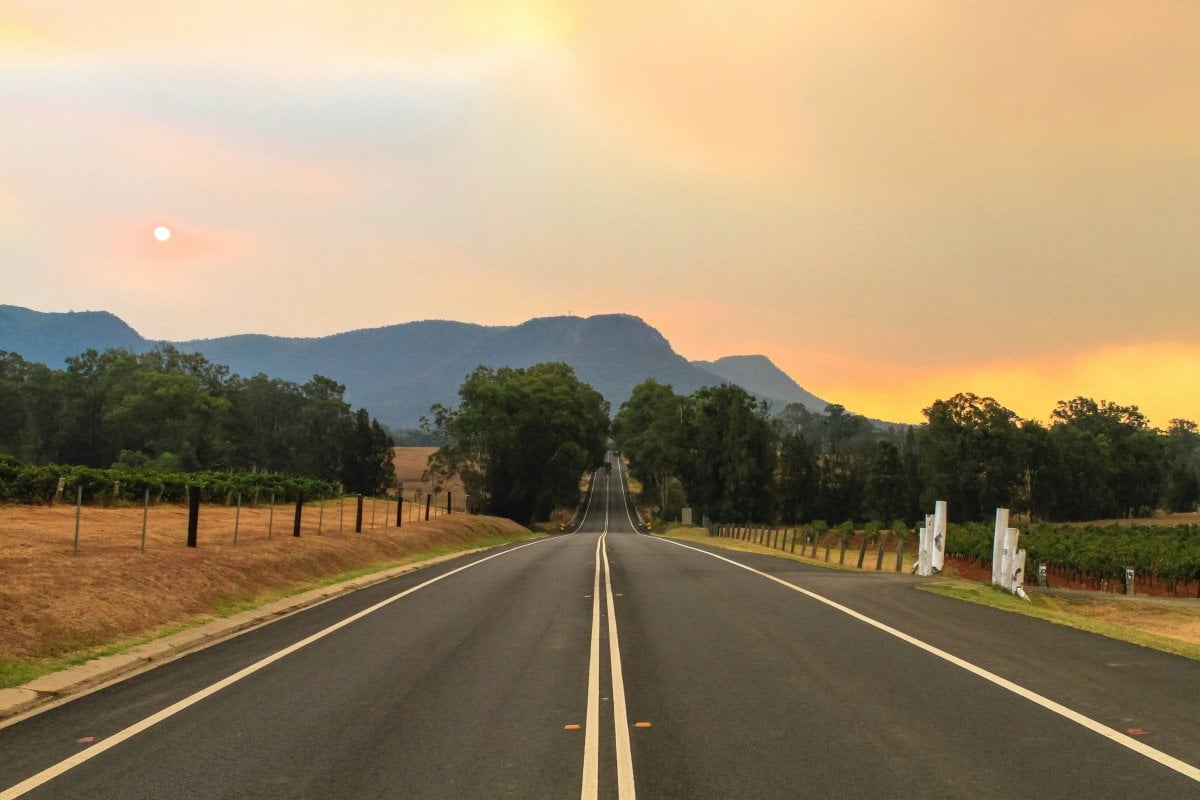
When five people die on Australian roads every single day, it's time to ask some hard questions.
That stark reality has become even more confronting with recent statistics showing road deaths have hit their highest level since 2010, with 1,337 deaths in the year to 31 May 2025.
For Diane McMurtrie, these aren't just numbers—they represent a national crisis that demands urgent action. After losing her daughter Hannah in a car crash, she established Hannah's Blue Butterflies Road Safety Awareness and is now leading the charge for much tougher penalties for repeat dangerous drivers.
The latest data reveals that 31.4 per cent of road deaths involved people aged 40 to 64 years (421 deaths), followed by 21.6 per cent of deaths for those aged 26 to 39 years (290 deaths). Perhaps most concerning for our community, people aged 75 years and over showed the greatest increase in deaths, with 24 more fatalities—a 14.4 per cent increase from 167 to 191 deaths.
'If we had five people a day being stabbed in the streets, there would be an outcry'
What exactly are the 'Fatal Five'?
The Fatal Five are the five main causes of road crashes in Australia: speeding; drink and drug driving; failure to wear seatbelt; driving while fatigued; and distraction and inattention. These behaviours are responsible for the majority of fatal traffic accidents across the country.
Diane wants anyone caught committing these offences repeatedly to face mandatory jail time, along with compulsory traffic offender programs and visits to morgues to meet families who've lost loved ones.
The Fatal Five driving behaviours
Drink and drug driving
Speeding (including inappropriate speed for conditions)
Mobile phone use and other distractions
Not wearing a seatbelt
Driving while fatigued or inattentive
'Repeat offenders are making decisions, and they're fatal ones,' Diane told Yahoo News. 'Decisions have consequences. Criminals walk free, get suspended sentences or a slap on the wrist, and instead, it's the families with the life sentences.'
The reality behind road death statistics
The numbers paint a sobering picture. In the 12 months to 31 May 2025, there were 1,337 deaths on Australian roads compared to 1,276 for the same period in 2024—a 4.8 per cent increase. In seven of the 12 months, the national monthly road toll exceeded 100 deaths.
What's particularly alarming is that this contradicts the National Road Safety Strategy's goal to halve road deaths by 2030. According to the Australian Automobile Association, this latest data shows the strategy 'has seen fatalities increase 21.9 per cent since its inception'.
Males continue to be disproportionately represented, with around 2.9 times more males than females involved in fatal crashes. While male road deaths decreased slightly by 1.6 per cent, female road deaths increased dramatically by 18.9 per cent.
Do harsher penalties actually work?
Before we rush to embrace Diane's call for tougher sentences, it's worth examining whether harsher penalties actually reduce road deaths. Research suggests the answer isn't straightforward.
Studies show that between 20 and 30 per cent of drink drivers reoffend, and due to their repeat offending and high blood-alcohol concentrations, they contribute disproportionately to road trauma. However, a New South Wales evaluation of doubled drink driving penalties in 1998 showed only minimal decreases in repeat offending despite the severity of new penalties, though drivers may have taken longer to reoffend due to lengthier sanctions.
Research on penalty effectiveness
- 20-30 per cent of drink drivers reoffend despite penalties
- Doubled penalties in NSW showed minimal impact on repeat offending
- Licence disqualification is the most effective penalty
- Consistent enforcement more important than penalty severity
- Targeted interventions addressing underlying causes crucial for repeat offenders
The research indicates that licence disqualification needs systematic application as it is the most effective penalty for drink driving, and the underlying causes of repeat offending should be identified to inform effective treatment responses.
A patchwork of penalties across Australia
One of Diane's key arguments—that we need consistent national laws rather than separate state and territory jurisdictions—is well-founded when you look at the current penalty variations.
Victoria is known for strict drink-driving laws and mobile phone detection cameras, with fines exceeding $1,800 for repeat offenders. Western Australia enforces mandatory jail time for high-range drink driving, described as 'one of the toughest road rules in the country'.
In South Australia, motorists must slow down to 25km/h when passing stationary emergency vehicles, with penalties extending up to $1,895 and nine demerit points, while Victoria requires drivers to slow down to just 40km/h in similar situations, with fines up to $961.
The ACT has some of the toughest penalties for drug driving in Australia, with offenders facing hefty fines, potential imprisonment, and long-term licence disqualifications, particularly for repeat offences.
New technology catches more offenders
While Diane pushes for harsher penalties, authorities have been investing heavily in new enforcement technology. From July 2025, police are using AI-powered cameras to detect phone use, seatbelt violations, and erratic driving, along with real-time number plate recognition to find expired registrations.
These 'smart' road cameras are popping up across the country, with 183,315 seatbelt non-compliance fines issued in recent data: 22,655 by police and 160,659 by cameras. The technology is clearly having an impact on detection rates.
Respective governments have justified these enforcement adjustments following the worst road toll figures in 15 years, with all penalties, fees and charges in NSW increasing by 3.2 per cent from July 1 to reflect the Consumer Price Index.
What this means for older drivers
For Australian drivers over 60, these statistics and enforcement changes have particular relevance. The 75+ age group experienced the largest increase in road deaths, suggesting that road safety challenges aren't just about young, reckless drivers.
The new AI-powered cameras don't discriminate by age—they'll catch anyone using their mobile phone at traffic lights, not wearing a seatbelt, or committing other Fatal Five offences. With penalties increasing across the board and enforcement becoming more sophisticated, even minor lapses in concentration can result in significant fines and demerit points.
The message is clear: regardless of your driving experience, staying informed about current road rules and penalties is more important than ever. With states implementing different rules and technology making enforcement more efficient, what might have been a warning five years ago could now result in immediate licence suspension.
The path forward
Diane McMurtrie's petition for national consistency in road laws has merit, particularly given the confusing patchwork of penalties currently in place. Research shows that among the general population, personal contact with random breath testing has the strongest deterrent impact on drink driving, and targeted interventions that identify underlying causes of offending are crucial in addressing recidivist drivers.
Perhaps the solution isn't just about making penalties harsher, but making them more consistent, predictable, and coupled with proven intervention programs. The combination of uniform national laws, consistent enforcement, and rehabilitation programs addressing the root causes of dangerous driving behaviour might prove more effective than simply increasing jail time.
What This Means For You
As Australia grapples with its worst road safety performance in 15 years, the debate over penalties versus prevention will undoubtedly continue. What's certain is that with five people dying on our roads every day, the status quo isn't working.
Have you noticed changes in driving enforcement in your area, or do you support calls for national consistency in road laws? Share your thoughts and experiences in the comments below.
Original Article
https://au.news.yahoo.com/calls-to-...ional-crisis-five-people-a-day-061542750.html
Road deaths hit 15-year high—Australian Automobile Association
Cited text: The year to 31 May was Australia’s deadliest 12 months on the road since 2010, with 1,337 deaths, up 4.8 per cent from a year earlier.
Excerpt: road deaths have hit their highest level since 2010, with 1,337 deaths in the year to 31 May 2025
https://www.aaa.asn.au/2025/06/road-deaths-hit-15-year-high/
Monthly road deaths | National Road Safety Data Hub
Cited text: In the 12-month period ending July 2025, 31.4 per cent of road deaths were aged 40 to 64 years (421 deaths). This was followed by 21.6 per cent of deaths for those ag...
Excerpt: The latest data reveals that 31.4 per cent of road deaths involved people aged 40 to 64 years (421 deaths), followed by 21.6 per cent of deaths for those aged 26 to 39 years (290 deaths)
https://datahub.roadsafety.gov.au/progress-reporting/monthly-road-deaths
Monthly road deaths | National Road Safety Data Hub
Cited text: The cohort with the greatest increase in deaths was people aged 75 years and over, with 24 more deaths (14.4 per cent increase from 167 to 191 deaths).
Excerpt: people aged 75 years and over showed the greatest increase in deaths, with 24 more fatalities—a 14.4 per cent increase from 167 to 191 deaths
https://datahub.roadsafety.gov.au/progress-reporting/monthly-road-deaths
Fatality Free Friday: Part 3 of the Fatal Five—Brisbane Central
Cited text: So, the City and Valley Crime Prevention Unit along with the QPS want you to think about the Fatal Five; the five main causes of road crashes in Austr...
Excerpt: The Fatal Five are the five main causes of road crashes in Australia: speeding; drink and drug driving; failure to wear seatbelt; driving while fatigued; and distraction and inattention
https://mypolice.qld.gov.au/brisbanecentral/2016/05/25/fatality-free-friday-part-3-fatal-five/
Sharp rise in road deaths | News | Open Road
Cited text: In the 12 months to 31 May 2025, there were 1337 deaths on Australian roads compared to 1276 for the same period in 2024—a 4.8 per cent increase.
Excerpt: In the 12 months to 31 May 2025, there were 1,337 deaths on Australian roads compared to 1,276 for the same period in 2024—a 4.8 per cent increase
https://www.mynrma.com.au/open-road/news/2025/sharp-rise-in-road-deaths
Sharp rise in road deaths | News | Open Road
Cited text: In seven of the 12 months, the national monthly road toll exceeded 100 deaths according to the statistics from the Bureau of Infrastructure and Transp...
Excerpt: In seven of the 12 months, the national monthly road toll exceeded 100 deaths
https://www.mynrma.com.au/open-road/news/2025/sharp-rise-in-road-deaths
Sharp rise in road deaths | News | Open Road
Cited text: “Far from halving roads deaths as planned, this latest data shows this strategy has seen fatalities increase 21.9 per cent since its inception,’’ Mr B...
Excerpt: According to the Australian Automobile Association, this latest data shows the strategy 'has seen fatalities increase 21.9 per cent since its inception'
https://www.mynrma.com.au/open-road/news/2025/sharp-rise-in-road-deaths
Monthly road deaths | National Road Safety Data Hub
Cited text: In the past year, around 2.9 times more males than females were involved in fatal crashes.
Excerpt: Males continue to be disproportionately represented, with around 2.9 times more males than females involved in fatal crashes.
https://datahub.roadsafety.gov.au/progress-reporting/monthly-road-deaths
Monthly road deaths | National Road Safety Data Hub
Cited text: The road death count for males decreased from 1,009 to 993 in the past 12 months (1.6 per cent decrease) compared to female road deaths, which increased from ...
Excerpt: Males continue to be disproportionately represented, with around 2.9 times more males than females involved in fatal crashes.
https://datahub.roadsafety.gov.au/progress-reporting/monthly-road-deaths
Effective drink driving prevention and enforcement strategies: Approaches to improving practice Drink driving prevention and enforcement strategies
Cited text: Research shows between 20 and 30 percent of drink drivers reoffend and due to their repeat offending and high blood-alcohol concentrations (BAC), cont...
Excerpt: Studies show that between 20 and 30 per cent of drink drivers reoffend, and due to their repeat offending and high blood-alcohol concentrations, they contribute disproportionately to road trauma
https://www.aic.gov.au/publications/tandi/tandi472
Effective drink driving prevention and enforcement strategies: Approaches to improving practice Drink driving prevention and enforcement strategies
Cited text: The results showed a decrease in recidivist drink driving in non-Sydney areas after the new penalties, but this was minimal compared with the severity...
Excerpt: a New South Wales evaluation of doubled drink driving penalties in 1998 showed only minimal decreases in repeat offending despite the severity of new penalties, though drivers may have taken longer to reoffend due to lengthier sanctions
https://www.aic.gov.au/publications/tandi/tandi472
Effective drink driving prevention and enforcement strategies: Approaches to improving practice Drink driving prevention and enforcement strategies
Cited text: licence disqualification/suspension needs systematic application as it is the most effective penalty for drink driving; the underlying causes of repea...
Excerpt: licence disqualification needs systematic application as it is the most effective penalty for drink driving, and the underlying causes of repeat offending should be identified to inform effective treatment responses
https://www.aic.gov.au/publications/tandi/tandi472
These Are the States with the Strictest Driving Penalties in Australia
Cited text: Victoria (VIC): Known for strict drink-driving laws and mobile phone detection cameras. Fines exceed $1,800 for repeat offenders.
Excerpt: Victoria is known for strict drink-driving laws and mobile phone detection cameras, with fines exceeding $1,800 for repeat offenders
https://stvincentsschoolasansol.in/...the-strictest-driving-penalties-in-australia/
These Are the States with the Strictest Driving Penalties in Australia
Cited text: Western Australia (WA): Enforces mandatory jail time for high-range drink driving, one of the toughest road rules in the country.
Excerpt: Western Australia enforces mandatory jail time for high-range drink driving, described as 'one of the toughest road rules in the country'
https://stvincentsschoolasansol.in/...the-strictest-driving-penalties-in-australia/
Every new Australian road rule and fine taking effect from July 1 2025 | Open Road
Cited text: Motorists in SA are required to slow down to 25km/h while passing said stationary vehicles, and if they don’t the penalty now extends up to $1895 and ...
Excerpt: In South Australia, motorists must slow down to 25km/h when passing stationary emergency vehicles, with penalties extending up to $1,895 and nine demerit points
https://www.mynrma.com.au/open-road/news/2025/new-road-rules-and-fines
Every new Australian road rule and fine taking effect from July 1 2025 | Open Road
Cited text: Victorian drivers are now required to slow down to 40km/h while passing some roadside vehicles from July 1, or face fines up to $961.
Excerpt: Victoria requires drivers to slow down to just 40km/h in similar situations, with fines up to $961
https://www.mynrma.com.au/open-road/news/2025/new-road-rules-and-fines
Drug driving penalties in Australia by state | Andatech
Cited text: The ACT has some of the toughest penalties for drug driving in Australia. Offenders, detected via saliva samples are required to appear before the cou...
Excerpt: The ACT has some of the toughest penalties for drug driving in Australia, with offenders facing hefty fines, potential imprisonment, and long-term licence disqualifications, particularly for repeat offences
https://andatech.com.au/blogs/resources/drug-driving-laws-in-australia-by-state
New Driving Fine Rules Across Australia from July 2025, Points and Penalties Explained
Cited text: From July, these include: AI-powered cameras to detect phone use, seatbelt violations, and erratic driving · Real-time number plate recognition to fin...
Excerpt: From July 2025, police are using AI-powered cameras to detect phone use, seatbelt violations, and erratic driving, along with real-time number plate recognition to find expired registrations
https://www.vanholio.com/australia-new-driving-fines/
Police enforcement | National Road Safety Data Hub
Cited text: ... 183,315 seatbelt non-compliance fines were issued: 22,655 by police (12.4 per cent) and 160,659 by cameras (87.6 per cent) 51,150 fines were issued ...
Excerpt: 183,315 seatbelt non-compliance fines issued in recent data: 22,655 by police and 160,659 by cameras
https://datahub.roadsafety.gov.au/safe-systems/safe-road-use/police-enforcement
Police enforcement | National Road Safety Data Hub
Cited text: ... 183,315 seatbelt non-compliance fines were issued: 22,655 by police (12.4 per cent) and 160,659 by cameras (87.6 per cent) 51,150 fines were issued for unlicensed...
Excerpt: 183,315 seatbelt non-compliance fines issued in recent data: 22,655 by police and 160,659 by cameras
https://datahub.roadsafety.gov.au/safe-systems/safe-road-use/police-enforcement
Every new Australian road rule and fine taking effect from July 1 2025 | Open Road
Cited text: Respective governments have justified the adjustments following the worst road toll figures in 15 years, as well as changes to the Consumer Price Inde...
Excerpt: Respective governments have justified these enforcement adjustments following the worst road toll figures in 15 years, with all penalties, fees and charges in NSW increasing by 3.2 per cent from July 1 to reflect the Consumer Price Index
https://www.mynrma.com.au/open-road/news/2025/new-road-rules-and-fines
Effective drink driving prevention and enforcement strategies: Approaches to improving practice Drink driving prevention and enforcement strategies
Cited text: Among the general population, personal contact with random breath testing has the strongest deterrent impact on drink driving. Also, targeted interven...
Excerpt: Research shows that among the general population, personal contact with random breath testing has the strongest deterrent impact on drink driving, and targeted interventions that identify underlying causes of offending are crucial in…
https://www.aic.gov.au/publications/tandi/tandi472







